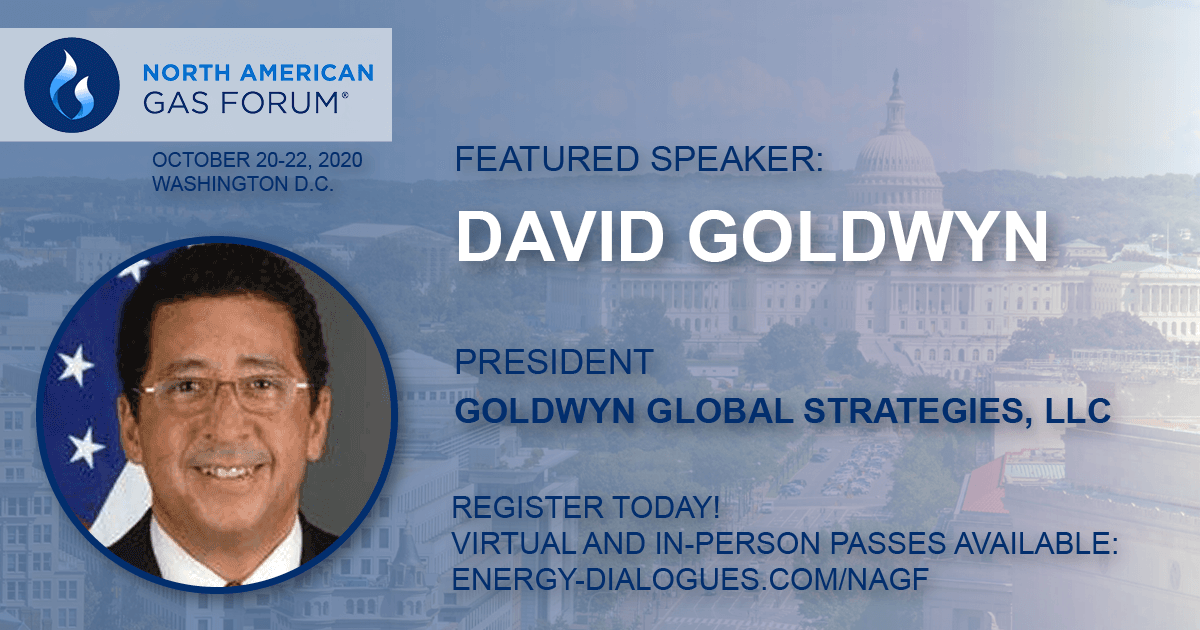Interview with David Goldwyn, President, Goldwyn Global Strategies LLC
Ahead of the 2020 North American Gas Forum we interviewed David Goldwyn, President of Goldwyn Global Strategies LLC.
David shared with us his view on the report recently released by the House Select Committee on the Climate Crisis, what we can expect under the new USMCA and the impact of the current pandemic crisis and economic climate on the upcoming elections.
David will be joining us as a panelist at this year’s North American Gas Forum on October 20-22, 2020 in Washington D.C. and virtually.
We invite you to read David Goldwyn’s full interview below.
ED: The House Select Committee on the Climate Crisis (HSCCC), with a vision to reach net-zero greenhouse gas emissions by 2050, recently released its report- Solving the Climate Crisis: The Congressional Action Plan for a Clean Energy Economy and a Healthy, Resilient, and Just America. In your opinion, what are the key takeaways and will the report shape future dialogue?
DG: The Select Committee on the Climate Crisis devised a comprehensive, politically savvy path to net zero emissions by 2050 and net-zero power by 2040. It is a strong marker of where House Democrats will begin in 2021 if the party controls both houses of Congress under a new Biden administration. In addition to the obvious impacts on domestic demand for natural gas, the key elements are on methane, pipelines and infrastructure permitting for various types of energy. The report calls for a “national methane pollution reduction goal for the oil and gas sector of 65% to 70% by 2025 and 90% by 2030, relative to 2012 levels, and a phase-out routine flaring of methane” – a priority issue which many US oil and gas companies agree should be addressed. For pipelines, it calls on Congress to “direct regulators to set new standards for pipeline operators to detect and repair methane leaks; provide financial support for cities and states to eliminate methane leaks from natural gas distribution lines within 10 years. ” For permitting, the report recommends amending the Natural Gas Act to require consideration of “upstream and downstream greenhouse gas emissions, community and landowner impacts, and market necessity on a long-term and regional basis.” The report refrains from hard and fast prohibitions on fuels or infrastructure, but instead requires that their full impacts be accounted for. The key impacts on LNG are likely to be a higher bar for permitting new liquefaction plants, and a higher priority on accessing natural gas supply which has a lower carbon footprint. If Europe implements a carbon border adjustment policy, which it is on track to do, US LNG exporters will need to distinguish themselves from competitors based on the carbon intensity of their products.
ED: On July 1st the USMCA (United States-Mexico-Canada Agreement) officially came into effect and replaced NAFTA (North American Free Trade Agreement) which was in place since 1994. What can we expect under the USMCA? How will it impact the regional energy sector?
DG: While USMCA does expand the trade agreement into some important new areas, and greatly improves labor and environmental protections, it has some negative impacts on the energy sector when compared to the original provisions in NAFTA. USMCA only provides broad levels of investor protection for companies that have an agreement with the sovereign, mostly in upstream oil and gas production. For those companies investing in renewable energy such as wind and solar power, as well as gas pipelines and other areas, there is no comparable investor-state dispute mechanism. Given the significant erosion of the rule of law in Mexico, the suspension of auctions and the decline in the quality of regulators and regulation, these protections will be sorely missed and will be a serious headwind for North American energy integration.
ED: You will be joining us as a speaker at this year’s North American Gas Forum (October 20-22 in Washington D.C.) where you will be discussing the U.S. elections. In your opinion, how will the current pandemic and economic climate influence the upcoming elections?
DG: The twin crises of Covid– 19 and the accompanying economic collapse make 2020 a very consequential election. Interest will be at an all-time high, but the pandemic poses challenges for in-person voting. There is a shortage of election security officials and depending on the level of a state’s response to the pandemic, great concern by citizens about the risk of exposure from in-person voting. The need for efficient systems for early voting and mail-in balloting is great, but the preparedness of many states is heterogeneous and uneven at best. The President’s attacks on mail-in balloting, while unjustified, may discourage voting. That said, I continue to expect a record turnout despite the risks.
ED: What are you most looking forward to at this year’s North American Gas Forum?
In the event we are lucky enough to have a safe socially distanced in-person meeting, I’ll look forward to seeing colleagues face-to-face again. Given the dramatic changes in global demand, and the prospect of a dramatic change in how the US and the world addresses climate change, I look forward to discussions on the future of the US gas industry, the role that natural gas, especially LNG, will play in the energy transition, and the ways that industry can address the irreversible social demand for measuring and mitigating the climate and environmental impacts of new energy infrastructure.
The North American Gas Forum will return to Washington D.C. on October 20-22, 2020. Our attendees’ health and safety is our top priority. We are keeping a close eye on the evolution of the coronavirus pandemic and following the recommended CDC guidelines for this and all our upcoming events.






